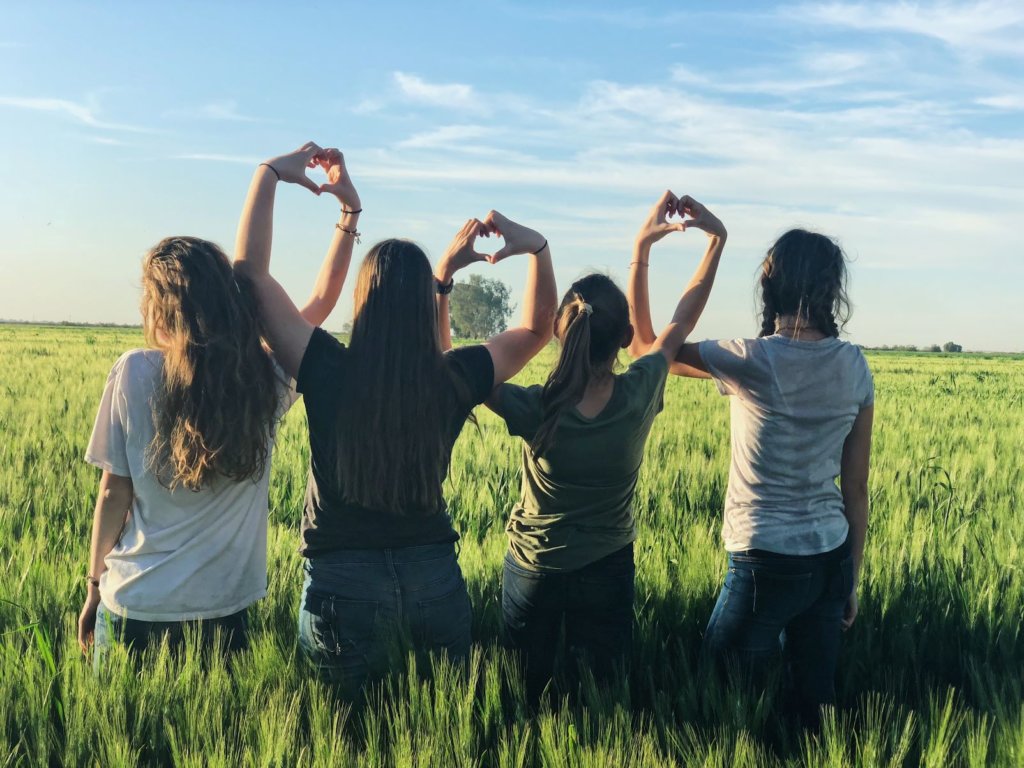Oftentimes when I hear about terrible news events – fires in Europe, flooding in the U.S., mass shootings, etc. – life feels like too much. There are too many things wrong with the world and how are we possibly going to fix them all? It’s overwhelming to contemplate and easy to fall into despair and cynicism. I see a lot of that online: “We’re all screwed! The world is going to end!” I get it. I’m tempted to fall into that place myself, but then I remember something Rabbi Tarfon, who lived almost 2,000 (!) years ago said: “It is not your duty to finish the work, but neither are you at liberty to abandon it.”
A more poetic way to phrase that courtesy of Rabbi Tirzah Firestone is, “You are not expected to complete the task of repairing the world. But neither are you allowed to put it down.” We’re not here to fix every problem, tackle every big issue. We can’t. It’s impossible. What we’re facing is too vast, but what we can do is be one part of the human relay race.
Have you seen that track event where one runner has a baton and then they pass it to the next person? That’s what I think humanity is like. We’re each carrying a baton that we give to the person ahead of us. We do that over and over again until eventually, humanity is in a different place than it was before. But if we don’t hold up our end of the bargain, if we don’t run with our baton, how can anything change?
I’m reminded of a quote from my spiritual teacher who says, “There are some people who are pessimistic. They say that the society around us is very bleak … Pessimists say this because they have never made any detailed study of human history, nor do they care to. Had they done so, they would certainly be optimistic, because if they had looked carefully at the symptoms of pause, they would have realized that significant preparations were being made for the subsequent phase of speed. So under no circumstances should human beings be pessimistic. That is why I am always an incorrigible optimist, because I know that optimism is life.”
I’m not Pollyanna over here, I know what’s happening in the world and I know it’s incredibly challenging. But I also recognize it’s my duty as someone who is alive right now to not put down the task of repairing the world. What that means for me is different than what it means for you, but we are all here for a reason. We are all alive at this time in this life not merely to take up space but to play a role in this great drama.
Hafiz said it so beautifully in the poem “The Place Where You Are Now” that I’m going to quote a portion of:
“This place where you are right now
God circled on a map for you.
Wherever your eyes and arms and heart can move
Against the earth and the sky,
The Beloved has bowed there –
Our Beloved has bowed there knowing
You were coming.”
The Beloved knew we were coming to be a part of a giant human relay race where we do one thing that someone else carries forward, that they carry forward, that someone else picks up ad infinitum. But it’s up to us to say “yes” to the task.
I dream of a world where we recognize we aren’t going to solve all the world’s problems ourselves. Instead, we are only one part of the solution like a human relay race. A world where we maintain optimism in the face of extreme difficulties because we’ve studied human history. A world where we understand we all play a part in repairing the world.
Another world is not only possible, it’s probable.
Someone asked me recently, what do I care what Elon Musk does with his money? To start with, why shouldn’t I care? We live in a society that pretends we’re not all connected. That what one person does somehow has no effect on anyone else. Want to own a newspaper company? Sure, go ahead! Build a rocket so you can go to space? Knock yourself out! Won’t make a difference in my life! But it does.
My spiritual teacher says, “The establishment of an ideal society depends on the mutual help of the members and their cooperative behavior.” We don’t have that. Instead, we have a hypercompetitive, rugged individualism mindset that is frankly antisocial. To take a recent example, Elon Musk’s buyout of Twitter is for his own gain. He’s not using money to help solve world hunger like he suggested he might.
In October 2021, David Beasley, the director of the United Nations’ World Food Program, told CNN that it would only take “$6 billion to help 42 million people that are literally going to die.” When the article was shared on Twitter, Musk responded and said he would sell Tesla stock if the program could provide a plan. Beasley did and thus far Elon has not donated. Some people think he still will, but I’m not holding my breath because again, most billionaires use their money for selfish pleasures like going into outer space, buying yachts, and building numerous multimillion-dollar homes. Either that or they use their money to acquire more wealth.
Another reason why I care what billionaires do with their money is it gives them an outsized voice. In the case of Elon Musk, owning Twitter will give him far too much influence on a media platform that has repercussions worldwide. Why should one person have so much power? Plus, when it comes to governance, the opinions of Jeff Bezos, Bill Gates, and Elon Musk far outweigh mine because they can afford high-priced lobbyists and unlimited campaign contributions. If a bill is bad for their business, it’s highly unlikely it will get passed.
Not to mention, the average citizen suffers when wealthy people make mistakes. When the banks failed in 2008, people lost their investments and their homes while bank executives received huge bonuses. We bailed out the banks but the ones who caused the loss of homes and investments became richer, according to Reuters.
What’s the solution here? A maximum wage, for starters, but also changing what we value. Instead of being in a race to acquire as much as we can as fast as we can, yogic philosophy touts aparigraha or non-indulgence. Specifically, not indulging in the amenities and comforts of life that are superfluous for the preservation of physical existence.
In the case of billionaires and their vast accumulation of resources, they’re hurting everyone. Income inequality depresses economic growth, leaves less for society to divvy up, and gives rise to criminal behavior, according to several studies referenced in the Washington Post.
So the short answer to why I mind how billionaires spend their money comes down to this: I care about the collective. My spiritual teacher says, “The collectivity is not outside you – your future is inseparably connected with the collective fortune. You must take the entire collectivity with you and move toward the sweetest radiance of the new crimson dawn, beyond the veil of the darkest night.”
To take the collectivity with us, we have to concern ourselves with what billionaires are doing and furthermore, not let people become billionaires in the first place.
I dream of a world where more people care how billionaires spend their money. A world where we understand our futures are inseparably connected to the futures of others. A world where we take to heart the principle of aparigraha. A world where we move together to create an ideal society.
Another world is not only possible, it’s probable.
This post was originally published in July 2017.
The other week I read an interesting philosophical treatise about the structure of our universe, which is an oval. We are made up of atoms with electrons moving around a nucleus. On a larger scale, the Earth is the nucleus and the moon is moving around it. In our solar system, the sun is the nucleus and all the planets are moving around it. However, there is also a Supreme or Cosmic nucleus, according to my spiritual philosophy.
A friend commented on the discourse and said from his perspective, we are all emanating out from the same nucleus. We all have the same center, the same core. Regardless of whether or not a person believes in a Cosmic Consciousness, or subscribes to my spiritual philosophy, we do have the same core. It is a fact we are all made up of atoms. It is a fact we are all made up of stardust, to paraphrase Carl Sagan. To quote an article on the subject:
“The carbon, nitrogen, and oxygen atoms in our bodies, as well as atoms of all other heavy elements, were created in previous generations of stars over 4.5 billion years ago. Because humans and every other animal as well as most of the matter on Earth contain these elements, we are literally made of star stuff.”
I’ve been hearing about this concept for many years so it’s easy for me to gloss over it, but thinking about how we all have the same core, allows me to connect even deeper with others because inside we are the same, and knowingly or unknowingly, we are moving together. Some people are moving closer to the Supreme hub like the Dalai Lama or others like him that carry a universal outlook.
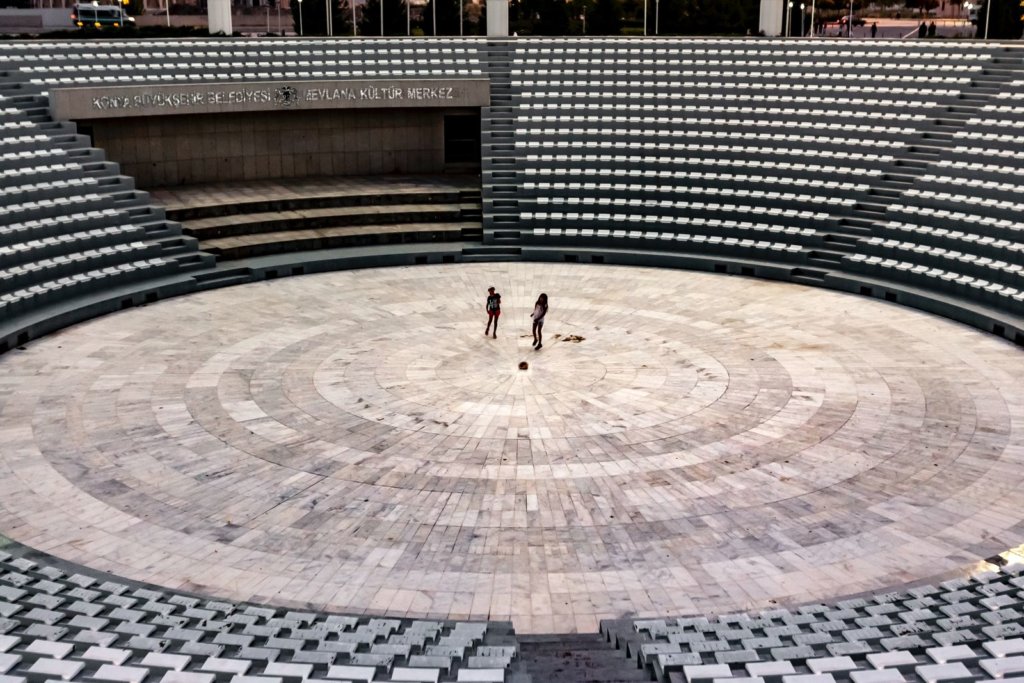
We are all dancing around a nucleus. Photo by Hulki Okan Tabak on Unsplash
People who espouse ideas about oneness, connection, and moving beyond the boundaries of our identities are getting closer to the Cosmic nucleus. They aren’t necessarily joined just yet, but they’re getting closer! And that’s what my spiritual teacher says we should all do.
“Each and every aspirant, each and every artist, each and every scientist, and each and every philosopher must be ensconced in this supreme veracity,” he said. “They will have to be one with the Supreme, [and] each will have to coincide his or her microcosmic nucleus with the macrocosmic one.”
The speed with which this happens varies, and some people move further away from the nucleus, but no one can move beyond its scope. Even the most terrible person, even the most despised people are still circling the nucleus. They may be at the periphery, but they still have the same nucleus, and that means I can recognize those people, too, are a part of my universal family. They, too, are on a spiritual journey with me and that means I can soften my heart toward them. Because we are all connected at the core.
I dream of a world where we recognize we are all made of the same stuff. A world where we recognize we all emanate from the same source. A world where we remember we are all circling the same nucleus. A world where we recognize we are more connected than we often acknowledge.
Another world is not only possible, it’s probable.
Facebook keeps showing me pictures from trips I took to Europe years ago, including one from Denmark in 2016. What I remember about that trip, other than laughing and exploring the country with a dear friend, is how everything reminded me of something else.
For instance, gazing out a train window, I could have sworn I was in Iowa, not Denmark, because the land was so similar. At the beach, the combination of the sand’s color, dunes, and water reminded me of the Outer Banks in North Carolina. I know there are places in Denmark that are completely unique, but all in all, whenever I travel, I’m reminded everything is more the same than it is different. Yes, the landscape, but also the people.
I may not speak the same language as someone else, but we both care about our friends and family. We both want to be happy, to feel secure in where we live. We all have the same needs, and in times like these, all times really, it’s important to keep focusing on what binds us.
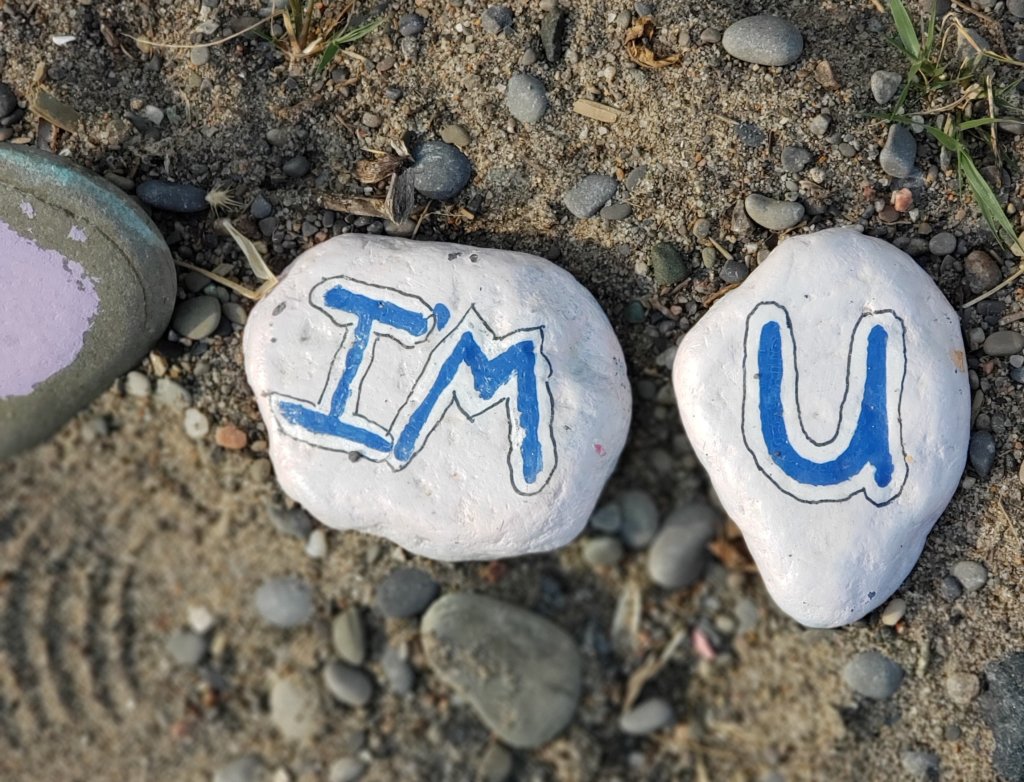
These rocks say it all. Photo by Phyllis Poon on Unsplash
In our world, there are some people who are trying to create division. There are some people who use one group or another as a scapegoat for the world’s problems. They speak in broad strokes like, “All of these people are like this,” or “Those people are like that,” which is dangerous. When we enhance separateness, that creates conflict because at the root of mistreatment is an “us” and “them” mindset. It’s easier to justify atrocious acts when a person becomes someone who is “not like me.” Or even worse, not human.
My spiritual teacher corroborates this and says “us” and “them” thinking makes different groups become more violent toward each other. We’ve seen this over and over again. Frankly, haven’t we had enough? I’m not so naïve to think there will never be any conflicts in the world, but I think we start moving in a better direction when we realize, to paraphrase Shakespeare, that we all bleed when we are pricked, that we all feel pain and sorrow, that we all want to be happy and to realize our dreams. We want the same things even if how we go about achieving them is different.
I’ve used this quote before but it continues to be relevant. My spiritual teacher adds, “Human society is just like a garland which is made of different types of flowers, woven together by one common thread. The overall beauty of the garland is dependent upon the beauty of each flower. Likewise, each strata of society must be equally strengthened if we are to maintain the unity and solidarity of society.”
We must all be lifted up. We must support one another. We must see each other as people who are just like us if we have any hope of maintaining unity and solidarity. Peace comes from a place of connection and that starts with recognizing we are more similar than different.
I dream of a world where we recognize what unites us rather than divides us. A world where we focus on our similarities, not our differences. A world where we remember people are people everywhere. A world where we work together to create as much peace as we can.
Another world is not only possible, it’s probable.
Like many people, Ukraine is on my mind. I’m watching in horror as Russia is brazenly invading another country in a quest for power. Republican Senator Mitt Romney told NBC in January that he believed Russian President Vladimir Putin wants to reestablish what he had before, a type of Soviet Union. And furthermore, Putin is clear he thinks the breakup of the Soviet Union was a catastrophe for Russia, once describing it as the “greatest geopolitical tragedy” of the 20th century. So, um, yeah, I’m pretty sure he’s not invading Ukraine on a “peacekeeping mission.”
Here in my own country of the United States, I’m feeling equally disheartened as I witness more and more evidence that we don’t live in a democracy, or rule by the people, but rather a plutocracy, the reign of the rich. The political system is only paying lip-service to the average person’s problems and is instead working diligently to protect and grow the wealth of the already wealthy. For instance, billionaires increased their net worth by more than $1 trillion during the coronavirus pandemic, according to Americans for Tax Fairness. Meanwhile, non-wealthy Americans have struggled to survive, closed their businesses, and generally haven’t profited due to the pandemic.
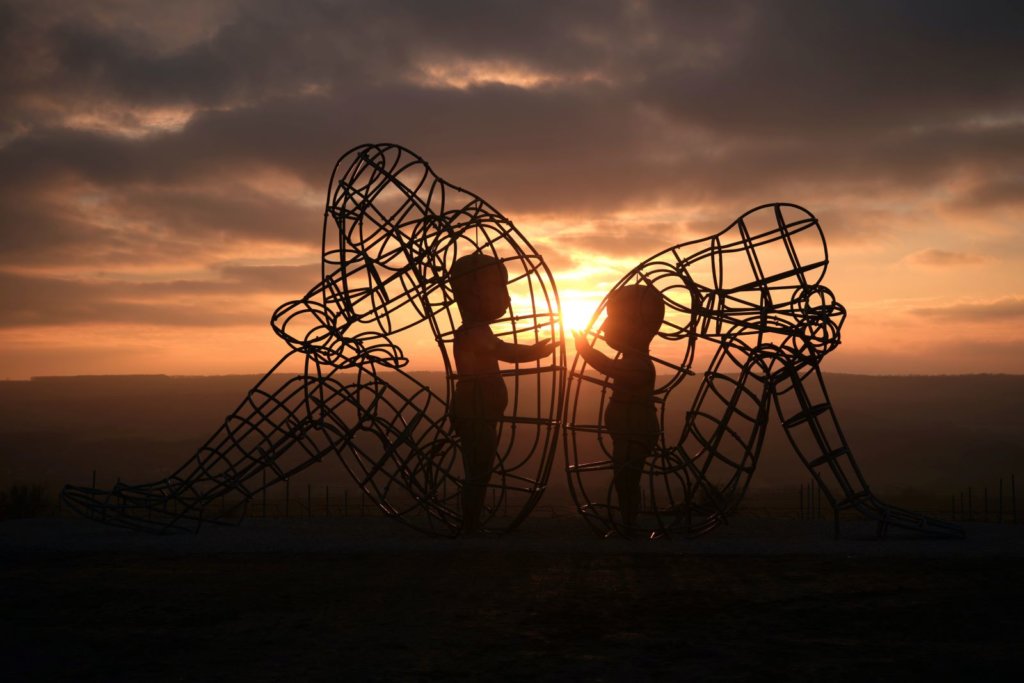
A very appropriate image by Ukrainian artist Alexander Milov titled “Love.” Photo by Adam Hornyak on Unsplash
Hearing all this is enough to make me want to lie down on the floor and moan like the Wicked Witch of the West, “Ooooh, what a world! What a world!” And unlike the Wicked Witch, I’d add, “What a cruel, cruel world!” With facts like these it’s easy to fall into despair, hopelessness, maybe some fear. After all, I’ve seen some memes circulating that we’re witnessing the start of World War III.
At times like these, I turn to my spiritual practice because it’s a source of strength and calm. My spiritual teacher said people suffer from all sorts of complexes, including a fear complex and a defeatist complex. When you’re afraid, you’re not thinking clearly. And when you feel defeated, you’re not empowered because you think some other person, system, or circumstance is more powerful than you. Sometimes it is, so that’s why banding together with others is important. What’s also important to remember though is a concept I wrote about last week: letting your life belong to love.
In this case, it’s about letting love move you, to act through you. When I think I’m the one that has to tackle a system that prioritizes profits over people, I get overwhelmed. When I think I have to “figure everything out,” or somehow “solve the world’s problems,” it makes me want to not even try. Who am I? My spiritual teacher would say I’m love incarnate. That the powerful, creative force that births stars and creates planets resides in me. I’m not a lonely, insignificant human being, but instead the progeny of the Divine, and that means something. It matters.
Regarding Ukraine, plutocracy, and any other issue pressing on my heart and mind, I can let love lead, guide me in my actions, and show me the way. I don’t have to do everything by myself because instead I recognize I’m a puzzle piece of the cosmos. My little actions combine with someone else’s little actions and that can topple oppressive political systems. I don’t know when, but I don’t have to, because instead I’m letting love lead the way.
I dream of a world where we allow ourselves to feel our feelings while also remembering who we really are. A world where we understand we are divine children working in tandem with the greatest force in the universe. A world where we realize we each have our parts to play and we’re not enacting them alone. A world where we let love lead the way.
Another world is not only possible, it’s probable.
As we celebrate Dr. Martin Luther King Jr.’s birthday here in the U.S., I keep thinking about one of my favorite quotes of his. There are many because the man was an eloquent speaker, but in 1963 he said, “Injustice anywhere is a threat to justice everywhere. We are caught in an inescapable network of mutuality, tied in a single garment of destiny. Whatever affects one directly, affects all indirectly. Never again can we afford to live with the narrow, provincial ‘outside agitator’ idea. Anyone who lives inside the United States can never be considered an outsider anywhere within its bounds.”
It’s an interesting concept, and one that continues to be relevant, this notion of “outsider” and how we apply justice to anyone we perceive to be an outsider. Did you know it’s been 20 years since the first detainees arrived at Guantánamo Bay? And that those prisoners were subjected to torture? Only 39 prisoners remain and more than a dozen of them have yet to face charges. They have been dubbed “forever prisoners” by some Democrats. The cost of operating the prison is about $13 million per prisoner every year, according to a Business Insider article! Are you freaking kidding me? I could think of a lot of better uses for $13 million per person.
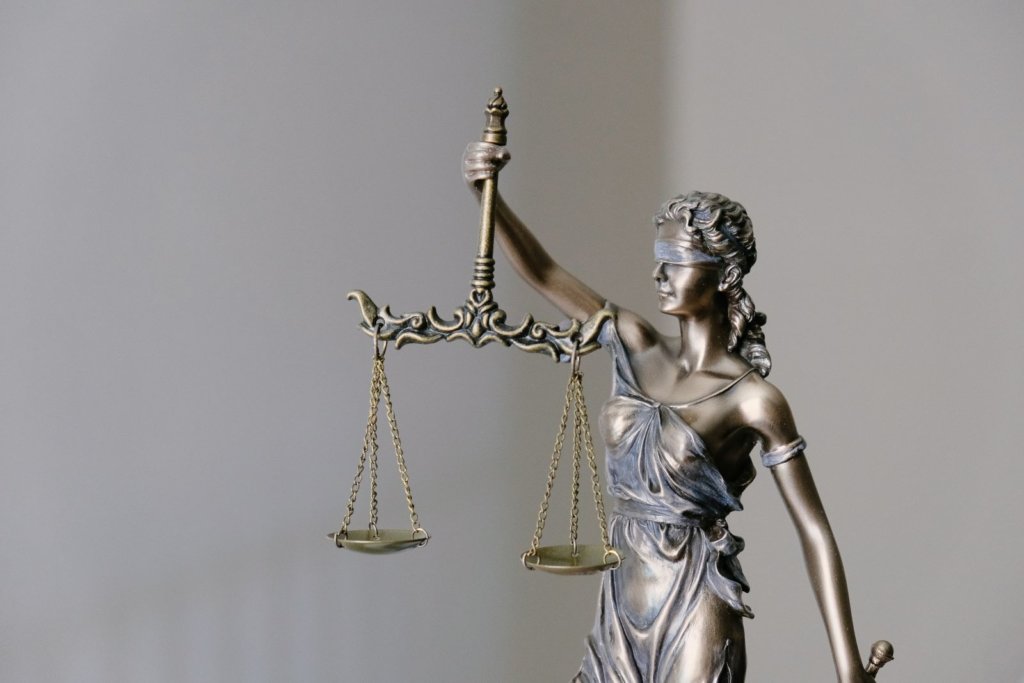
Justice is supposed to be blind, but is it? Photo by Tingey Injury Law Firm on Unsplash
And even if you’re saying, “Yeah but they’re terrorists! They need to be held captive!” The cost to house a single prisoner in California is more than $75,000, according to the LA Times, which is still more than a year at Harvard. Clearly there’s a lot of injustice, a lot of mismanaging funds, and yet a small group of people continue to let incidents like these occur.
It brings to mind an excellent article I read on LitHub by Rebecca Solnit posted in 2018 about how there’s a myth surrounding the “real” America. She wrote:
“[I]n the news and political life, we’re still struggling over whose story it is, who matters, and who our compassion and interest should be directed at.
“The common denominator of so many of the strange and troubling cultural narratives coming our way is a set of assumptions about who matters, whose story it is, who deserves the pity and the treats and the presumptions of innocence, the kid gloves and the red carpet, and ultimately the kingdom, the power, and the glory. You already know who. It’s White people in general and White men in particular, and especially White Protestant men, some of whom are apparently dismayed to find out that there is going to be, as your mom might have put it, sharing. The history of this country has been written as their story, and the news sometimes still tells it this way – one of the battles of our time is about who the story is about, who matters and who decides.”
Precisely. So much of justice and injustice is tied to who matters and who decides. If Black people don’t matter, then it’s fine to kill them in the streets. If terrorists don’t matter, it’s OK to torture them. But who exactly is deciding they don’t matter? And why is that those people are in charge? The reality is the White population in the U.S. is declining and other races are increasing. Where I live, the majority of people are not White. To my mind, that means decisions being made about policies and procedures should take into account that diversity, should recognize this country belongs to everyone who lives here. In essence, to bear in mind what Dr. King mentioned so long ago: that injustice anywhere is a threat to justice everywhere.
I dream of a world where we treat all human beings with love and respect. A world where we value justice not only in word but in action. A world where we celebrate and protect human diversity while also seeking to transcend divisions. A world where we honor Dr. King’s legacy by bringing his dream into reality.
Another world is not only possible, it’s probable.
Something I’ve heard before is that physical health is a privilege. When people said that, I brushed it aside because I thought they meant health is something to be grateful for, a blessing, a gift. But now, as I approach my 37th birthday, I recognize physical health is an attribute to be grateful for yes, but it’s also a privilege similar to how we talk about White privilege. Meaning, something most people don’t think about, or take for granted, unless they’re in the group that doesn’t have it.
There’s a lot to say about White privilege but to summarize, it’s the obvious and less obvious passive advantages that White people may not recognize they have. It’s moving through the world with relative ease. Swap out “White” for “healthy” and the privilege is similar (similar but not the same). This post is focusing specifically on physical health, but there is also mental health privilege.
For someone like me – a person recovering from adrenal fatigue, a sleep disorder, digestive issues, a spoonie – I’m not able to navigate the world with relative ease. I’m forever worried my small business will crumble because I can’t work full-time due to limited energy. And supporting myself with a part-time job is challenging, which I know, because I did it for years.
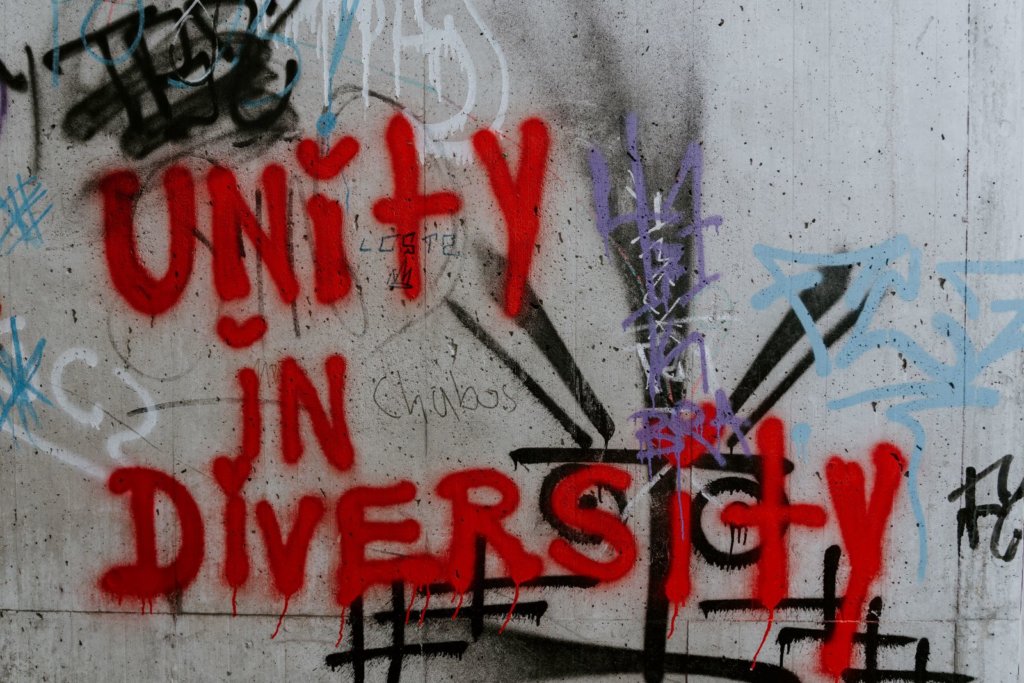
This graffiti says it all. Photo by Claudio Schwarz on Unsplash
In the days before my birthday, I’m crying because I feel like I’m getting older without ever having been young. For only three years in my 20s did I feel mildly energetic, healthy, vibrant, pleased with how my body looked and functioned. The rest of my life has been one issue after another after another. And as I’m crying about my own health challenges, I think about friends of mine, or people I know, who have chronic fatigue syndrome, fibromyalgia, Crohn’s disease, thyroid issues, etc., and I realize we’re sold this image of what is “normal,” of how our bodies are “supposed” to be. Not unlike the ideals sold to us via White supremacy like beauty standards and the body mass index.
Thinking about all of this, I really get that health is a privilege. Not everyone is given health. We aren’t all born with perfectly functioning bodies that slowly deteriorate over time as we age. No. Some of us never have perfectly functioning bodies. Some of us have to take medication and eat certain foods and take daily naps to even approach what others have naturally.
Now instead of feeling sad, I’m angry because I’ve bought into this message about an ideal body – and I’m not talking shape and size – that is literally not achievable for some people. The kicker though is our bodies can change drastically from one year to the next depending on a multitude of factors – some of which we control. I personally spend an inordinate amount of time on those factors. A soul sister tells me, “I don’t know of anyone who takes as good of care of their body as you do.” And yet, all of that care barely moves the needle on my health. And I’m lucky because I don’t live with constant pain unlike some people!
It seems to me we’re in the age of celebrating diversity with race, gender, sexual orientation, and cognitive function (in some circles). It’s time to welcome in the body too. Not only when it’s obvious, but when it’s subtle.
My spiritual teacher says, “Human society is just like a garland which is made of different types of flowers, woven together by one common thread. The overall beauty of the garland is dependent upon the beauty of each flower. Likewise, each strata of society must be equally strengthened if we are to maintain the unity and solidarity of society.”
To me that means normalizing some people have health challenges in the “prime” of their life. It means recognizing some people never experience relative ease in how they move through the world on a physical level. It means making room for and supporting people like me who have invisible illnesses. It means not relegating us to the shadows or acting like we’re an anomaly because we’re not. We’re just as normal as anyone else.
I dream of a world where we create space for all people and not act like some are part of the “in” crowd and others are not. A world where we recognize diversity is what makes human society beautiful. A world where we understand that uniqueness is normal and in turn means it’s important to create a more accessible, supportive world for us all.
Another world is not only possible, it’s probable.
I love a good Hero’s Journey as much as the next person. If you’re unfamiliar with the concept, it’s a common story arc found in movies like Star Wars, The Matrix, and Lord of the Rings where the hero goes on an adventure, is victorious in a decisive crisis, and comes home changed or transformed. The hero can also be female, as we see in The Hunger Games.
However, despite swapping out a male character for a female one, the hero’s journey is not the same as the heroine’s journey, meaning it doesn’t address the psycho-spiritual journey for many women. (I’ll also add in here it’s likely the hero’s journey doesn’t work well for some men either.) Joseph Campbell popularized the Hero’s Journey in 1949 with men in mind and said “Women don’t need to make the journey. In the whole mythological journey, the woman is there. All she has to do is realize that she’s the place that people are trying to get to.”
Um, thanks Joe. I mean, on the one hand I get that he’s pointing toward wholeness and encouraging men to embrace the more feminine aspects of themselves, but on the other hand, what about us ladies?!? For women, there’s the Heroine’s Journey, developed by Maureen Murdock. If the Hero’s Journey is about ascending a mountaintop, the Heroine’s Journey is about descending to the underworld. When a friend said that to me recently, my response was, “Yeeeesssssssss,” because that’s EXACTLY my experience. All of my demons have been internal. All of my personal development work has been about confronting my own shadow and reclaiming wholeness.
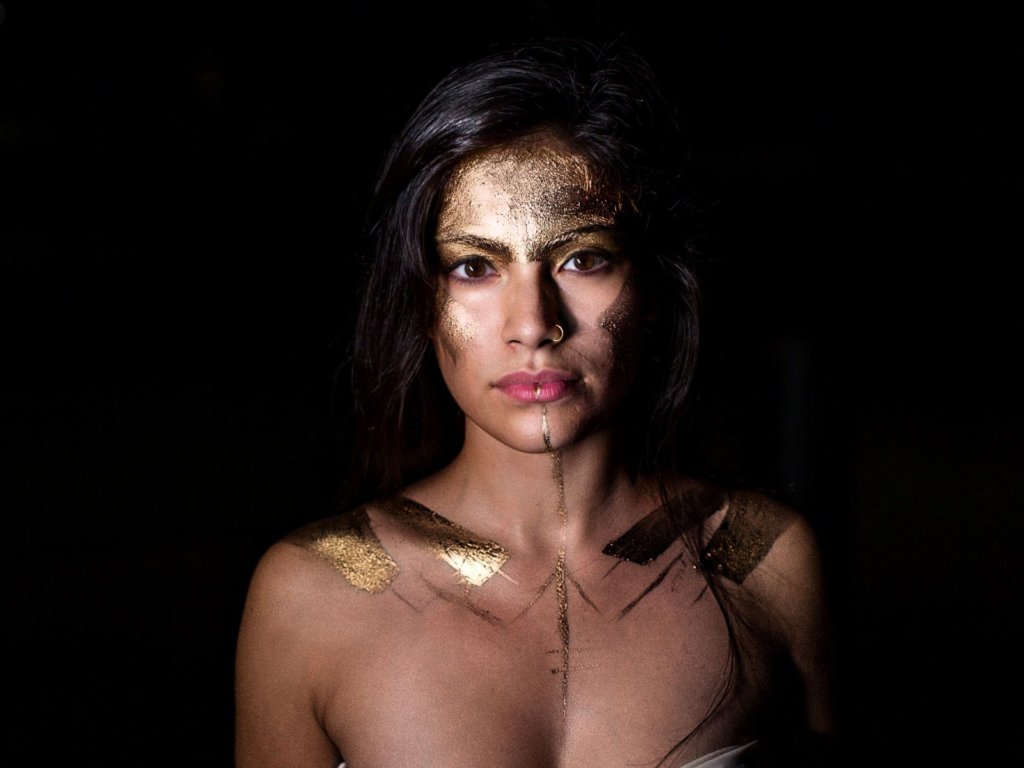
For some people, they undertake the heroine’s journey. Photo by ActionVance on Unsplash
Part of confronting the shadow comes from interacting with other people of course. I’m not saying the Heroine’s Journey takes place in a locked room. We see this in two popular movies that follow the Heroine’s Journey arc: Pixar’s Brave and the first Wonder Woman movie. I remember when I watched both those movies for the first time how touched I felt afterward. They impacted me in a deep way and I could see myself reflected in the characters that I couldn’t as much when watching the original Star Wars, for instance.
What makes the Heroine’s Journey different? Instead of ending the story after successfully conquering ogres and dragons, the heroine becomes disillusioned and realizes she feels unfulfilled. Something is missing in her life and she falls into despair because of it. She yearns to reconnect with her whole self – the feminine, soft side and the wounded masculine – and integrates the two. After doing so, she interacts with the world beyond binaries and understands complexity.
This is forever what I’m working on and in fact is a part of the spiritual journey as well as the journey society is taking. My spiritual teacher says, “Until recently there was a defective idea in all the corners and amongst all the groups of people on the Earth, that males are blessed beings, and not females. In your family life, you know, you feel that the parents cannot have any sense of disparity in their mind regarding their sons and daughters. Both are equally important; both are equally loving. I said my sons and my daughters are just like two hands of mine. They are just like the wings of a bird. A bird having one wing cannot fly.”
My teacher is speaking specifically about the role of women in society – women need to be respected and treated just as well as men – but I think the concept also applies within a person as well. We are like birds and can’t fly properly if one wing is more dominant than another. The Heroine’s Journey is one mechanism that supports our return to wholeness and one that I’m now embracing.
I dream of a world where we realize the Hero’s Journey is not everyone’s journey. A world where we understand the alternative, the Heroine’s Journey, could help us become more whole. A world where we integrate all aspects of ourselves – masculine and feminine – in order to fly freely through the world like the beautiful birds we are.
Another world is not only possible, it’s probable.
This week I read a Twitter thread about the creator of the latest Netflix phenomenon “Squid Game.” According to several news pieces, Hwang Dong-hyuk wrote the show in 2009 but was rejected by studios for 10 years. He once had to stop writing the script and sell his $675 laptop because of money struggles. The Twitter thread author, Ifę, @ifetalksback, said as a writer they find the story terrifying more than inspiring.
As part of the thread, Ifę said, “They’ll be like ‘I had to wait 15 years, my mother don’t speak to me anymore, I lost a finger to typing so much, I can’t remember the last time I saw the sky. But now I have a show,’ And the comments from everyone who ISN’T a writer is like ‘NEVER give up bro, so inspiring.’”
I agree – on the one hand, it’s always inspiring when long-awaited dreams come true, but on the other hand, I find the story to reflect poorly on not only the film industry, but also us as a society in general. Hwang had to literally sell one of the tools of his trade in order to make ends meet. That’s not OK.
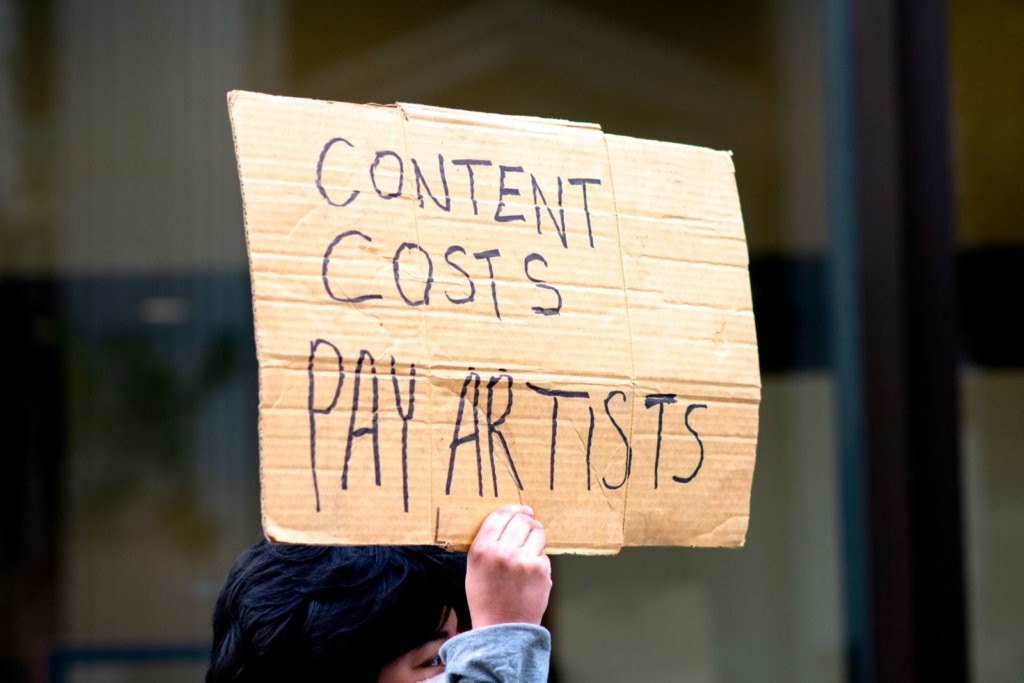
The picture says it all. Photo by Patrick Perkins on Unsplash
My spiritual teacher says it’s the duty of society to support its artists because artists are pioneers. “If those who are the pioneers of society … if they are forced to starve or half-starve, this will certainly not be to the credit of human society. It is unthinkable that these creative geniuses should curse their own fate.”
Seriously. Artists – and that includes writers – have a special role to play in society and letting them struggle is not cute or inspiring or romantic or whatever notions we have in this modern world. It’s a travesty. Especially during the pandemic, we’ve seen the importance of art and literature. What would we do, how would we survive if we didn’t have books to read, movies to watch, games to play? For many, escaping into entertainment was, or is, the only way to feel joy during an otherwise extremely bleak period. And yet we let artists like Hwang Dong-hyuk toil away and then romanticize his rags-to-riches story? No.
What would happen if artists were supported and didn’t need to work “day jobs” or have numerous “side hustles” or live with 10 roommates just to survive? What sort of art would they make? What would they be able to accomplish if they weren’t constantly worried about money? In case you can’t tell, I’m PISSED this is the situation we find ourselves in. Not only for artists, but for everyone.
Who does this capitalistic, hypercompetitive economy work for? Very few, that’s who. And the reality is we don’t have to live like this. I don’t know how we release ourselves from the shackles of capitalism, but I do know there are other ways to live. Ways in which people are guaranteed the basic necessities of life like food, clothing, education, shelter, and medical care. Ways in which people are valued over profits, the environment is respected, and we as a society are able to satisfy our higher intellectual, artistic, and spiritual aspirations. Ways in which artists like Hwang Dong-hyuk don’t have to sell their laptops in order to pay their bills.
I dream of a world where we not only praise artists and writers, but we value them with our wallets. A world where we support artists and writers so they can do what they were put on this Earth to do – create. A world where we understand artists barely making ends meet is appalling, not romantic.
Another world is not only possible, it’s probable.
P.S. This might be a good time to mention I have a Patreon campaign. If you value my work, consider contributing.
Something that’s been on my mind a lot, as I’m sure it has for many others, is the situation in Afghanistan. I’m watching in horror as the Taliban is taking over once more and all the progress from the past 20 years is disintegrating. How does this happen? Why hasn’t the narrative we’ve been sold – that the U.S. brings democracy and freedom to other countries – work? (I know we invaded Afghanistan in response to terrorism, but we also tried to establish a Western-style democracy.) It doesn’t work because there’s a very specific dynamic at play.
When a foreign country invades to supposedly make things better, they are often viewed as a bully throwing their weight around. They become resented and are seen as meddling in affairs they know nothing about. And if the foreign power does set up projects and organizations to aid the local denizens, those projects and organizations often crumble when the foreign power leaves. Why? Because the foreign country is enacting subordinated cooperation instead of coordinated cooperation.
Where people do something individually or collectively, but keep themselves under other people’s supervision, that’s subordinated cooperation. It’s the traditional power structure we see, well, pretty much everywhere. It’s the traditional work situation where a boss issues commands from on high and the employees follow those commands. The employees have less agency or power and aren’t as invested in their work because they don’t have a say.
In the case of Afghanistan, our military trained and equipped nearly 300,000 people to take over when we left. It was justification for our withdrawal. What happened when the U.S. withdrew? That army dwindled to only about 500 people.
U.S. News and World Report stated the local forces “simply put down their weapons, defected to the Taliban willingly or because their families faced threats, or succumbed to the other forms of bribery and waste that American inspectors general have been publicly documenting for at least a decade.”
In the same article, Army Gen. Mark Milley is quoted as saying, “They had the training, the size, the capability to defend their country. This comes down to an issue of will and leadership.” His quote is very revealing – he said the issue came down to “will” and “leadership.” He’s a military man looking for a military solution. The military is all about subordinated cooperation and not coordinated cooperation so of course as soon as the head honchos left the army fell apart.
Imposing ideas and dictates upon another group doesn’t work. What does work is coordinated cooperation. It’s when cooperation is between free human beings, each with equal rights, mutual respect for each other, and they are working for the welfare of the other.
To quote my spiritual teacher, “Only the cooperative system can ensure the healthy, integrated progress of humanity, and establish complete and everlasting unity among the human race. People should work to enjoy sweeter fruits by establishing the cooperative system.”
A cooperative system cannot exist if one group is considered inferior to another. Nor can coordinated cooperation exist if it’s imposed upon the group. They have to believe themselves equal, to demand it, and not take anything else than they deserve. Local culture and customs must be respected and the local people must be the ones to initiate change – not someone who is considered an outsider. The situation in Afghanistan is a clear example of that.
I dream of a world where we employ coordinated cooperation and not subordinated cooperation. A world where we respect local customs and cultures while also empowering the disempowered. A world where we support change not in the form of imposition but instead in the form of nurturing.
Another world is not only possible, it’s probable.


